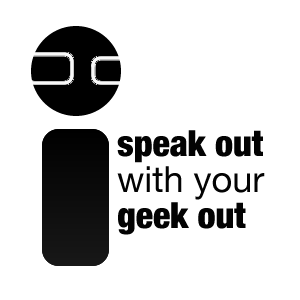 Every time we walk into the exhibitors’ hall at GenCon—huge, bright, loud, colorful, overwhelming to the senses—Clark and I remember what our friend Shivam Bhatt said to us one year. He looked around, soaking it all in with a huge grin on his face, and said, “Look at all these people who love all of these games. You see this game over here? It’s not my thing. But it’s his thing, and that’s awesome!”
Every time we walk into the exhibitors’ hall at GenCon—huge, bright, loud, colorful, overwhelming to the senses—Clark and I remember what our friend Shivam Bhatt said to us one year. He looked around, soaking it all in with a huge grin on his face, and said, “Look at all these people who love all of these games. You see this game over here? It’s not my thing. But it’s his thing, and that’s awesome!”
In many ways, conventions in general are like that for me—it’s fun just to be surrounded by other people who are passionate about games, even if they don’t express it the same way I would. At cons, not only do we fly our geek flags high, but in general people celebrate the many ways we’re all geeky. (This is not to trivialize, excuse, or dismiss the harassment I know some people have had to deal with—but my own experiences have been overwhelmingly positive and I very much hope that the negative experiences others have had are aberrations and not the norm.) My mom came to her first gaming convention this year and part of what struck her was the acceptance and support the gaming community offers.
At least, we do that when we’re dealing with each other face to face.
Then, back home, we all start talking to each other online. I tend to isolate myself a bit—this blog is pretty one-sided in that I have control over the conversation, Twitter and other social media are fairly easily managed, and I stay off the message boards. But I see a lot of second hand outrage as my friends and colleagues encounter people who are rude and insulting. There’s nerd baiting as a way to collect clicks. There are overworked moderators on the message boards trying to make sure people treat each other with even the barest of civility. There are links to some of the most horrifying things I’ve ever read that make me desperately hope that those people don’t truly believe the things they’re saying.
Many of us were insulted and bullied through our childhoods. How is it possible that we now do the same things to each other? Why can’t we rise above the tactics of the middle school playground? We get upset about how “outsiders” still look at us (stereotypes, insults, what have you) but we’re unspeakably cruel to each other, too. There are studies that suggest that this is the nature of online conversation, that people do this when they aren’t communicating face to face, as though the receiver of their communication isn’t actually a human being. And online, you can type out that snarky, mean response before your brain has even fully processed what you’re saying.
But I also think that we can rise above that. It just takes a little effort. Some parent, grandparent, or teacher probably told you once to count to ten before you speak and to try to put yourself in the other person’s shoes. We often forget those tactics as we grow up, because we’re supposed to have developed enough self control that we don’t have to think about it. And face to face, I’d bet that most of us have. But somehow our online conversations are different. We have some anonymity that emboldens us. We don’t see the reactions of the people who read our words, so we don’t perceive how we’ve hurt them until they spring back angry, and then we return the attack.
My kids’ school cafeteria is really loud—with that many kids in one room, you have to speak loudly to be heard. Then the people around you speak louder so that they can be heard. And then you have to talk louder than that or no one will hear what you’re saying, until it’s quite deafening. Every 15 minutes or so, a teacher asks for silence. It’s not to stop the kids from talking; it’s just to reset to volume level. Sure, it’ll build again, but at least it’s starting from a neutral point.
Speak Out With Your Geek Out is intended to be that moment of silence. Let’s spend a week being excited about the things that other people are excited about. Post about something you love, and read about the things that other people get excited about. This doesn’t mean you need to go play that game that doesn’t appeal to you—but for at least one week let’s not come down on the person who is. Appreciate the fact that there are people who know stuff and love to do stuff you can’t quite wrap your brain around.
This is part of why I love the miniatures game area at Origins—while I don’t have the time, patience, talent, or space to create those intricate models and set ups, it’s so cool that other people do. Their work is amazing, even if it’s for a game that I wouldn’t really enjoy. It’s not my thing. But it’s their thing. And that’s awesome.


2 Responses to Speaking about Geeking